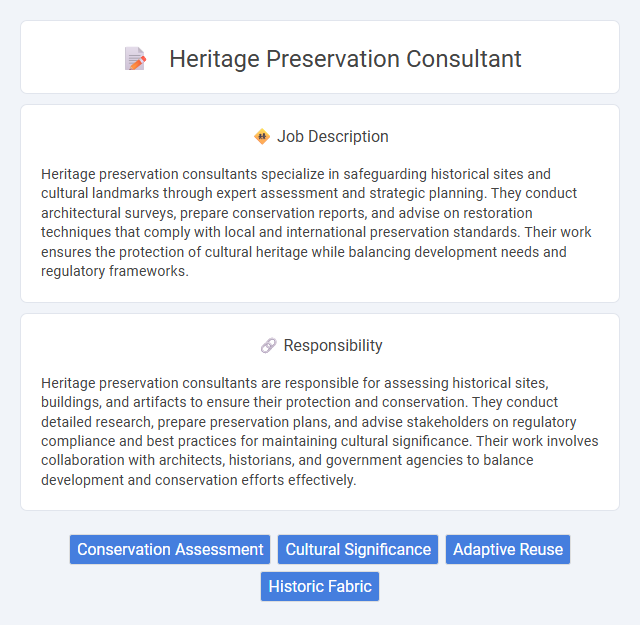
Heritage preservation consultants specialize in safeguarding historical sites and cultural landmarks through expert assessment and strategic planning. They conduct architectural surveys, prepare conservation reports, and advise on restoration techniques that comply with local and international preservation standards. Their work ensures the protection of cultural heritage while balancing development needs and regulatory frameworks.
Individuals with a strong interest in history, architecture, and cultural significance are likely to be well-suited for a Heritage Preservation Consultant role. Those who possess analytical skills, attention to detail, and patience in assessing and documenting historical sites may find the work engaging and fulfilling. Conversely, people who prefer fast-paced, less meticulous tasks or have limited interest in cultural heritage might face challenges adapting to the demands of this profession.
Qualification
Heritage preservation consultants must possess a strong educational background in fields such as archaeology, history, architecture, or cultural heritage management, often holding a bachelor's or master's degree. Proficiency in conservation techniques, regulatory compliance, and project management is essential alongside experience with historical research methods and site evaluation. Certifications like the American Institute for Conservation (AIC) credentials or equivalent regional qualifications enhance credibility and demonstrate specialized expertise.
Responsibility
Heritage preservation consultants are responsible for assessing historical sites, buildings, and artifacts to ensure their protection and conservation. They conduct detailed research, prepare preservation plans, and advise stakeholders on regulatory compliance and best practices for maintaining cultural significance. Their work involves collaboration with architects, historians, and government agencies to balance development and conservation efforts effectively.
Benefit
Hiring a heritage preservation consultant likely enhances the accuracy and effectiveness of conservation projects by applying specialized knowledge of historical significance and regulatory requirements. This role probably reduces the risk of costly compliance errors and preserves cultural integrity, attracting potential funding and community support. Consulting with an expert increases the probability of successful project approvals and sustainable preservation outcomes.
Challenge
Heritage preservation consultants likely face the challenge of balancing historical integrity with modern development needs, making decisions that respect cultural values while accommodating contemporary use. They probably encounter difficulties in navigating complex regulations and securing funding for conservation projects. Managing diverse stakeholder interests and addressing environmental impacts may also pose significant obstacles in their work.
Career Advancement
Heritage preservation consultants specialize in safeguarding cultural, historical, and architectural assets through expert assessments and project management, leveraging skills in conservation techniques and regulatory compliance. Career advancement often involves gaining certifications such as Certified Cultural Resource Manager or Historic Preservationist, developing expertise in digital preservation technologies, and accumulating experience in multidisciplinary collaboration with architects, archaeologists, and government agencies. Progression to senior consultant roles or project leadership opportunities typically requires demonstrated success in managing complex preservation projects, securing funding, and influencing policy development.
Key Terms
Conservation Assessment
Heritage preservation consultants specialize in conservation assessment by evaluating the historical significance, physical condition, and vulnerabilities of cultural sites and artifacts. They develop comprehensive strategies to maintain the integrity and authenticity of heritage properties while complying with legal and environmental regulations. Utilizing advanced documentation techniques and conservation science, these professionals ensure sustainable preservation practices for future generations.
Cultural Significance
Heritage preservation consultants specialize in identifying, evaluating, and safeguarding sites with cultural significance to ensure that historical narratives and community values are maintained. Their expertise includes assessing the impact of development projects on heritage assets and advising on preservation strategies that align with local and international conservation standards. These professionals play a critical role in protecting cultural landmarks, fostering community identity, and promoting sustainable heritage management.
Adaptive Reuse
Heritage preservation consultants specializing in adaptive reuse evaluate historic buildings to develop strategies that balance architectural integrity with modern functionality. They conduct thorough assessments, creating preservation plans that incorporate sustainable design principles while meeting contemporary regulatory standards. Their expertise ensures that cultural significance is maintained during transformations, promoting both community engagement and economic revitalization.
Historic Fabric
Heritage preservation consultants specialize in safeguarding historic fabric by assessing and documenting original materials, architectural features, and construction techniques. They develop conservation strategies that prioritize the retention and repair of authentic elements to maintain a site's cultural and historical integrity. Expertise in historical architecture, material science, and regulatory compliance is essential for effective preservation planning.
 kuljobs.com
kuljobs.com